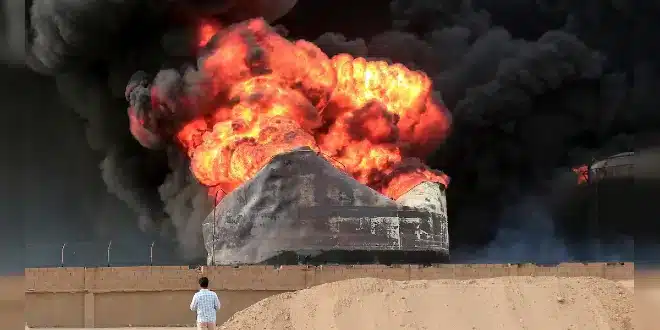Yemen’s Houthi rebels have vowed a “massive” response to Israel’s deadly attack on the port of Hodeida, escalating the regional conflict stemming from the prolonged war in Gaza.
This Israeli strike, which Israel claims as its first in Yemen, ignited oil tanks at the critical port. It followed the Houthis’ inaugural lethal assault on Israel.
On Sunday, Israel intercepted a missile launched from Yemen and targeted sites in southern Lebanon. Residents in southern Gaza reported intense fighting in the Rafah area.
These regional hostilities precede Prime Minister Benjamin Netanyahu’s trip to Washington, where efforts are underway to broker a ceasefire in the ongoing nine-month war between Israel and Hamas militants in Gaza.
Netanyahu’s office announced the dispatch of a negotiating team for renewed talks on a potential deal to release hostages held by Hamas. However, Saudi Arabia’s foreign ministry cautioned that Israel’s attack on Hodeida “exacerbates regional tensions and hampers ongoing efforts to end the Gaza war.”
Since Saturday, dozens have been killed across Gaza, according to the civil defense agency in the Hamas-controlled territory, with casualties reported from strikes in central Nuseirat and Bureij areas and near southern Khan Younis.
Residents indicated a significant military operation in a district west of Rafah, involving heavy artillery and clashes.
On Sunday, Abdul Malik al-Houthi, leader of the Iran-backed group, stated that the Hodeida strikes would lead to “further escalation and more attacks targeting Israel.” He emphasized that the deadly drone attack on Tel Aviv marked “a new phase” in their operations.
Houthi military spokesperson Yahya Saree warned of an inevitable and substantial response to the Israeli aggression.
Israeli Defense Minister Yoav Gallant highlighted the widespread impact of the strikes on Hodeida port, visible across the Middle East, and warned of further actions if the Houthis attacked again following the Tel Aviv strike, which managed to penetrate Israel’s extensive air defenses.
In Hodeida, the strike resulted in six deaths and 83 injuries, according to health officials. AFPTV footage showed intense flames and thick black smoke from the burning oil tanks, with significant damage to dock equipment.
Hodeida port is crucial for fuel imports and international aid for Houthi-controlled areas in Yemen, where over half the population requires humanitarian assistance, according to the United Nations.
Analysts suggest the strike on Hodeida may embolden the Houthis, who have endured repeated US and British strikes since January and thousands of air raids over nearly a decade of conflict.
On Sunday, the Israeli military reported intercepting a missile from Yemen aimed at the Red Sea resort town of Eilat. The Houthi spokesperson confirmed the launch of ballistic missiles towards the port.
In Lebanon, Hezbollah, an Iran-backed ally of Hamas, fired Katyusha rockets and drones at northern Israel in retaliation for Israeli strikes that hit a weapons depot and injured six civilians. Hezbollah, reporting three more fighter deaths, declared that Israel’s strikes on its Yemeni allies marked “a new, dangerous phase.”
Netanyahu Heads to Washington
The Gaza conflict began with Hamas’s October 7 attack on southern Israel, killing 1,195 people, mainly civilians, and taking 251 hostages, with 116 still in Gaza, including 42 confirmed dead by the Israeli military.
Israel, committed to destroying Hamas, has killed at least 38,983 people, mostly civilians, according to Gaza health ministry data. The war has displaced most of Gaza’s population, destroyed housing and infrastructure, and led to severe shortages of essential goods. The UN reports disease outbreaks in the region.
Israel has started vaccinating its troops in Gaza against polio and providing vaccines for the Palestinian population after health agencies detected the virus.
The war has spurred protests in Israel, with tens of thousands demanding a deal to free the remaining hostages. On Sunday, demonstrators gathered at Ben Gurion International Airport near Tel Aviv ahead of Netanyahu’s meetings in the US, where he will face pressure to secure a ceasefire with Hamas.


